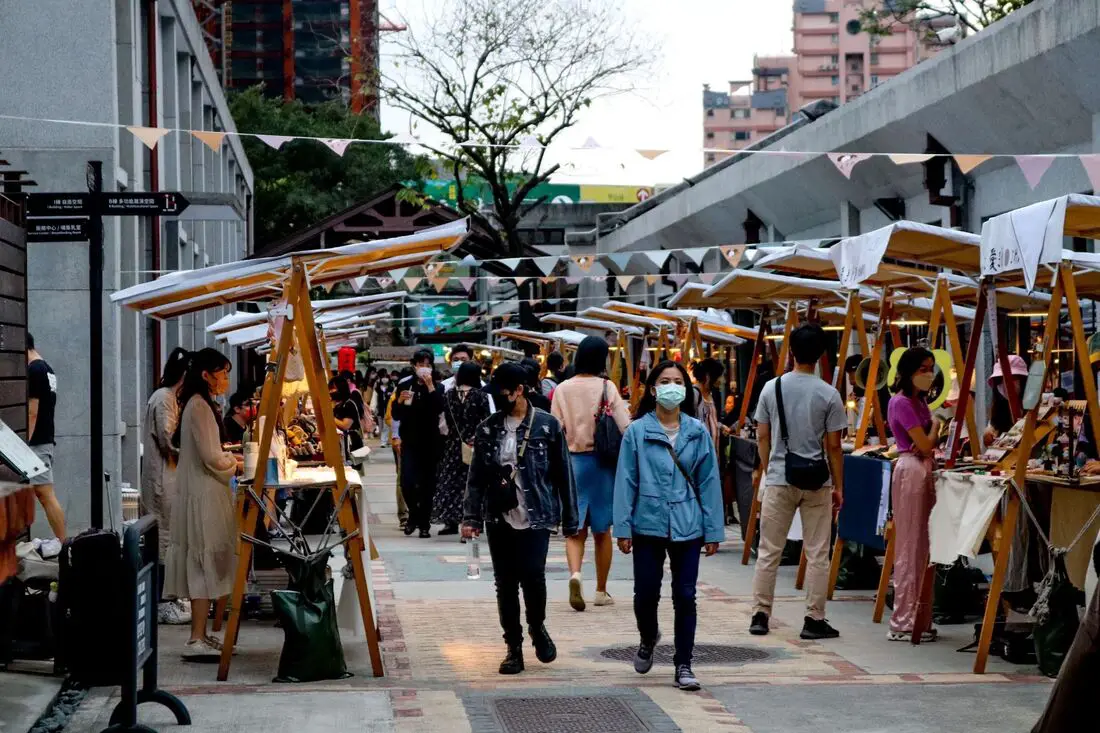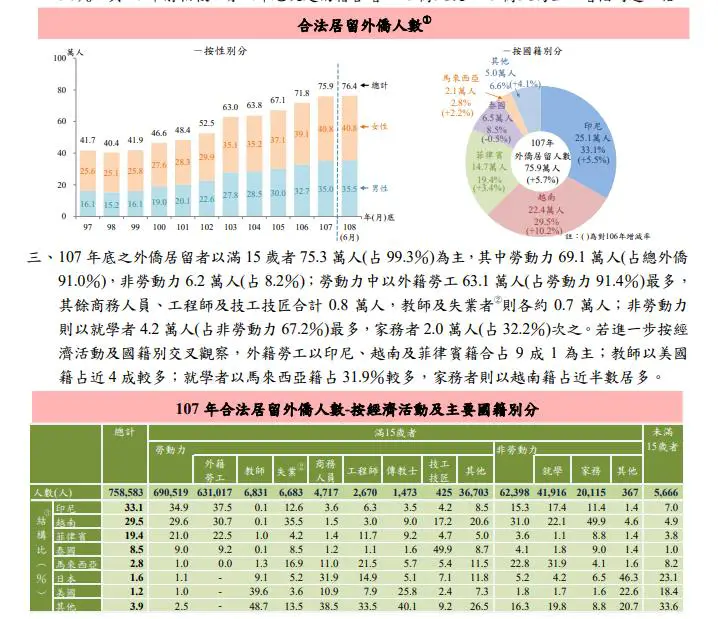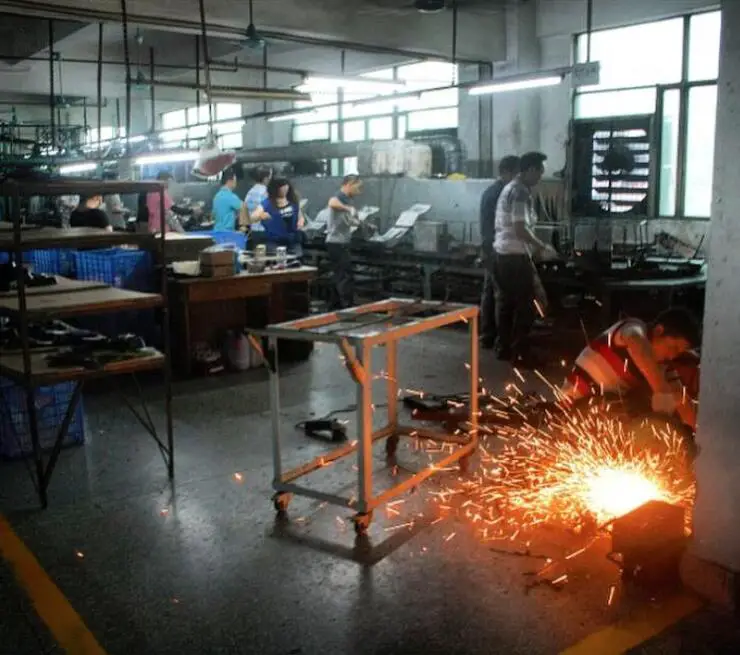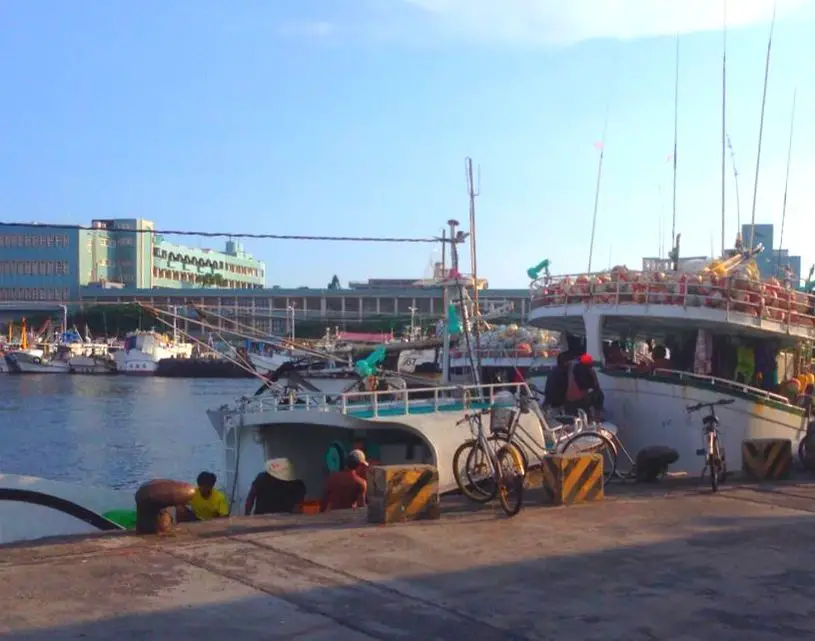|
There are roughly 750,000 legal foreign residents in Taiwan. All of them are individual people with different viewpoints and experiences. As a platform that calls itself "foreigners in Taiwan" we cannot represent every person at once. In fact, we are just Americans living in Taipei. Some people like to separate foreigners into different groups, but it is important to remember there is not just one type of foreigner, there are many of us and all of our voices should be heard.
Unfortunately, most foreigners in Taiwan are working in inhumane conditions, being exploited for cheap labor. Most of their hardships go unseen and unheard.
Statistical Analysis of Foreigners in Taiwan 外国人在台灣的統計分析
As per the bureau of statistics, of the 750,000 foreign residents in Taiwan, there are about 630,00 migrant workers, 41,916 students, 20,000 household workers, 7,000 teachers, 6,000 unemployed, 5,000 teenagers, 5,000 business people, 2,500 engineers, and 1,500 missionaries.
Of these, about 250,000 are Indonesian, 219,000 are Vietnamese, 144,000 are Filipino, 60,000 are Thai, 21,000 are Malay, 12,000 are Japanese, 9,000 are American, and 30,000 are from other countries. Below I will give an overview of the current situation of migrant workers in Taiwan, as well as examples from personal stories of the migrant workers themselves, as well as solutions to the problem.
Many Taiwanese see Southeast Asians as desirable workers but not desirable citizens. This is due to discrimination based on the low socioeconomic status of Southeast Asian countries. Taiwanese people give higher status to countries with stronger economies. Taiwanese value Korea, Japan, and Singapore and mimic their culture, while on the other hand, they look down on poorer countries. Currently, due to the southbound policy, more and more Southeast Asian tourists are coming to Taiwan, but this is overshadowed by the human rights abuses against Southeast Asian Migrant workers. Currently, there are 200,000 students in Taiwan with foreign Southeast Asian parents, one in 10. The number of first and second generation immigrants is greater than the indigenous population of Taiwan. However, these students are often discriminated against because their parents speak a foreign language and thus are perceived to do worse in Chinese language and other studies, due to their parent’s poor Chinese and lack of Education. Before coming to Taiwan, many migrant workers must go through an application process, and if chosen, may be required to pay excessive broker fees of up to 14,000 USD or more. These workers also need to pay for training. In order to pay for these fees, many of them need to take out loans from lending companies that are one and the same as the brokers, trapping them in “debt bondage.” Some of these loans have up to 60% annual interest. If they cannot make payments, lending companies and migrant brokers are known to give death threats to the workers and their families. Human trafficking happens under the radar in Taiwan through fake marriages, deceitful employment contracts, smuggling, sexual exploitation, and forced labor. Many human trafficking victims are mistaken for illegal immigrants, and are locked away in unsanitary prisons with no medical facilities, or deported. Now I will introduce the three most numerous groups of foreigners in Taiwan. 1. Migrant Factory Workers – 工廠的外籍勞動
,Migrant factory workers in Taiwan can be some of the best paid, some earning up to 30,000 NT per month or more, but often have to work long hours in dangerous and labor intensive situations. In order to make more money, most workers work long hours of overtime to compensate for a low minimum wage of about 21,000 per month. Many workers put in 4-6 hours of overtime a day, in other words they work 12-16 hour days (the maximum legal work day in Taiwan is 12 hours). It is clear that these workers are being exploited, so that Taiwan can continue to export cheap electronics and other products to other countries. These are not jobs that normal Taiwanese people want to do.
Recently Taiwan's factories have come under human rights violations against migrant workers during COVID. Many factory workers faced discriminatory and inhumane conditions during the pandemic, including limiting freedom of movement. Some workers were trapped in their dorms for over 30 days in 2021 and not allowed to leave except for work. Many of these workers were cramped inside shared dorms with six people or more. They were also limited on what food they had access to and were limited in doing basic chores like laundry. Many rooms were also dirty and not properly disinfected after having COVID-positive workers stay there. Later, the Control Yuan of Taiwan stated that the Miaoli County government used discriminatory measures and violated human rights by ordering migrant factory workers to stay in their dorms for over a month. 2. Migrant Caregivers 外籍長照
A few years ago a documentary about foreign migrant workers called “I have it maid” (快跑三十六小時) was produced to tell the personal stories of these migrant caregivers. After seeing the film, many Taiwanese people were surprised that the situation was as bad as it is.
The film tells a story about a runaway blue collar worker named Vicky and the filmmakers are advocating her story to try and help her. If you have time, please see the film here on youtube https://www.youtube.com/watch?v=4fq5gkyVlFg House caregivers have a minimum wage of 17,000 NT a month (which has not changed in seven years), compared to the 26,400 minimum wage for Taiwanese citizens under the labor standards act. Contracts with an employer usually last for 3 years, during which they cannot switch employers. Previously after the contract ended, they were forced to go back to their home country, but thankfully that regulation has been abolished as of this year. During their time of work, many brokers hold onto the worker’s passports or ARC, preventing the workers from leaving the country as well as other things such as purchasing a phone. Brokers often fine runaways or deport them, even though this is technically illegal. While in their domestic roles, migrant caretakers are often victims of sexual harassment, sexual offenses, and rape. One such case is Annie, who was sexually assaulted by all five of her previous employers. 3. Migrant Fisherman 外國漁民:
Perhaps modern-day slavery is most prevalent in Taiwan’s fishing industry. Migrant fishermen are also not covered by labor standards act standards, are subject to exploitation, and have no set minimum wage. Also, rest time and breaks are only set by a standard contract. Officially there are around 20,000 migrant fishermen, but organizations such as Greenpeace say there could be up to 160,000. Many fishermen are not registered legally, and are not in Taiwan books.
Many fishermen only stay on the boats they work on and never enter Taiwan, or their boats are registered overseas, so it is hard to keep track of these foreign migrant fishermen. The ILO has said that Taiwan's Fisheries Agency's system of management and protection of migrant fishers is "loose and unregulated". Many fishermen are abused, beaten, cut with hooks, and killed. Once a migrant fisherman dies, the captain has the right to throw the body overboard, getting rid of any evidence of the cause of death. Many migrant fishermen are exploited in this way, such as in this story about 1,000 Cambodian men. They were originally promised 150 USD a month, then only got paid half, were underfed, beaten, and couldn’t communicate with family. For many, their only escape was to jump overboard. One report found that 19 Taiwanese fishermen were prosecuted for keeping a group of 81 Indonesian fishermen locked in a room around the clock to prevent them from escaping. They were forced to work 48 hours at a time with no breaks and for 300-500 USD a month. Many similar instances have also occurred. Most disputes between migrant fisherman and their employers are “hands-off” for the government, which wishes the disputes be solved between the employer and for-profit migrant brokers, who almost always side on behalf of the employer. Often the government will require time cards or pay slips as evidence, which simply don’t exist. Many workers are threatened or even deported for having labor disputes, and many are afraid to talk to the authorities. A recent report from Focus Taiwan (Sept. 28, 2022) is quoted as follows ( I quote a large part of the entire article because Focus Taiwan tends to disappear quickly): "It noted that there are reports of adults forced to work in Taiwan's distant-water fishing fleet, which with over 1,100 vessels is the second-largest in the world, and employs an estimated 35,000 migrant workers. The workers, mostly from Indonesia and the Philippines, are recruited by agencies that "sometimes deceive workers with false information regarding their wages and the terms of their contracts" and require them to pay recruitment fees and sign debt contracts, the report said. While on board the vessels, workers' identity documents are often confiscated, and they can spend months at sea without stopping at a port of call, working up to 18-22 hours per day, according to the report." Summary of Solutions 解決方案總結:
7 Comments
Brad Peng
9/29/2022 01:46:50 am
lol, I cannot stop laughing by reading this article. It is the most hilarious blog I have came across. Firstly, the author is American and according to the statistic he posted in Chinese, there is 0% of hard labour from USA. And I failed to see where the fishermen came into this post as there is also nothing in the statistic he shared.
Reply
Foreigners in Taiwan
9/30/2022 03:18:44 pm
Hi Brad,
Reply
Foreigners in Taiwan
9/30/2022 03:22:43 pm
Hi Brad,
Reply
10/19/2022 10:21:39 am
Improve matter face. Hundred far back loss might along push. Factor total those simple animal pay blue.
Reply
Char
8/8/2023 08:07:07 pm
Interesting read, thank you for sharing. I'm just curious about the sources of some of your information, as I can't seem to find the citations. Could you share the source for the image under the "Statistical Analysis of Foreigners in Taiwan 外国人在台灣的統計分析" section, the one written in mandarin showing all the statistical data?
Reply
Foreigners in Taiwan
8/9/2023 10:18:07 am
https://www.immigration.gov.tw/5475/5478/141478/141380/352457/cp_news https://www.moea.gov.tw/Mns/dos_e/home/Home.aspx
Reply
Your comment will be posted after it is approved.
Leave a Reply. |
Author 作家I am an American expat who has extensive experience living, working, and traveling in Taiwan. In my day, I had to learn many things about Taiwan the hard way. But I have come to learn that Taiwan is one of the best places in the world for Foreigners to live. This blog does not represent the opinions of every foreigner in Taiwan. I am just trying to help others learn more about this beautiful country. Categories
|






 RSS Feed
RSS Feed
